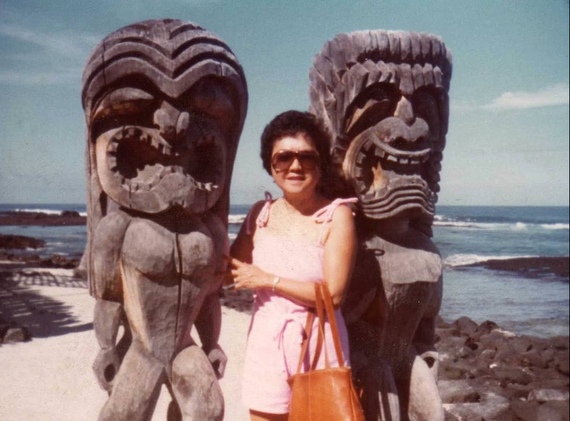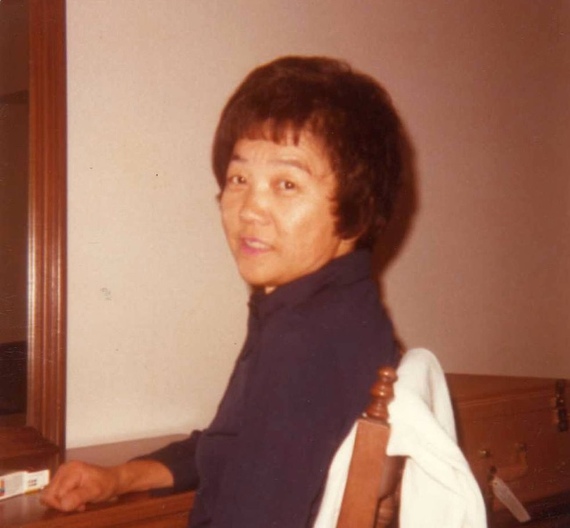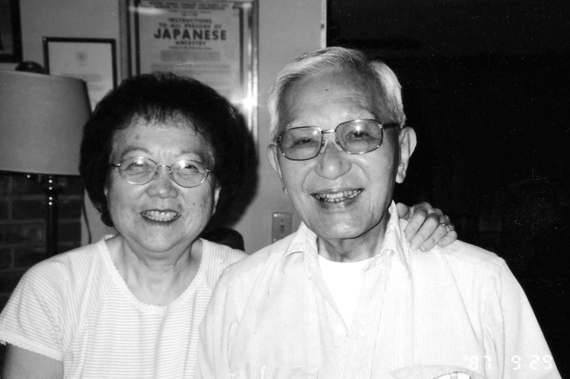I don't remember who brought it up first or why. But suddenly, as my family was gathered a few days after the death of my grandmother, we somehow found ourselves discussing the term "Dirty Sanchez."
Of course, myself and all the younger cousins were mortified. I think it was that my uncle had heard the term somewhere and asked about it. This sent us "kids" into a hysterical giggling fit which only drew more attention to the question, making all the other aunts, uncles, and my parents want to know what it was, too.
It was one of the most awkward, and ultimately funniest family moments. Of course, none of the kids wanted to tell the adults what it meant. We just went in circles laughing, with the kids avoiding the topic and the adults throwing wild guesses out there making us laugh.
And boy, did we need to laugh.
As I mentioned, we were all together because my grandma had just died. But I actually hate saying that. Something about it feels disingenuous. Even though it's true, it's a phrase that can bother me now 10 years later. Sometimes it is hard to say out loud, even to the people I am most emotionally intimate.
When someone says a grandparent died, there is generally some shared experience and/or universally understood sequence of events that happens.
Just saying "My grandma died" can conjure up images straight out a movie of the week.
INT -- Hospital Room, Night.
A family is gathered around Grandma in a hospital bed, surrounded by family who has obviously been by her side for days. TV Static flickers in the background.
When suddenly, the estranged, prodigal son comes home from the big city, she opens her eyes, grabs his hand, and without saying a word all is forgiven.
Grandma manages to say "I love you", when a candle mysteriously burns out as she closes her eyes, and everyone knows that it's the end.
FADE TO BLACK
My grandmother didn't give us that.
No health decline. No hospital vigil. No obvious warnings.
She took her own life. She was 73 years old, and just like that, left us alone.
We all have different relationships to our grandparents. I happened to be very close to my grandma. She came to virtually everything I performed or participated in. All my friends knew her, many of the other parents at school did as well. I even had a few people think that I lived with her and that she was raising me, because they saw her so much. She wasn't some distant relative I dreaded seeing twice a year. We were friends.
As word spread of her death, my friends, classmates, strangers I've only heard of by name, all so generously offered condolences. She was so well loved and remembered by so many, the outpouring of love in the wake of her leaving was overwhelming.
But I very quickly realized that this outpouring of grace and love was... off. It was just not sitting well with me.
No one really knew the details of her death, so that general grandma "shared experience" kicked in. To many, it seemed perfectly natural that she wasn't here anymore.
Every "I'm sorry for your loss" felt weird for me. In my grief, it felt like they were only giving me the amount of "sorry" appropriate for the Lifetime Movie death scene, not what actually happened. I found myself always half a moment away from the following exchange:
Well-meaning and thoughtful person: I'm sorry for your loss.
Me: (In a shouting, full on ugly cry, rage): No you're not. Don't you know that I'm going through something more complex than just a death of a grandparent?! That's all you can say to me?!
My grandfather, who was still alive at the time, didn't want anyone to know. As suicide can be with many people, for him this something for him to be embarrassed about, so I kept my mouth shut.
Well-meaning and thoughtful person: I'm sorry for your loss.
Me: (Inhales) Thank you.
It's such a complicated mix of emotions. And now, 10 years later, things are easier, sure. But on the wrong day, in the wrong moment, the simplest memory of her can cause me to break down, or in the opposite direction, make me want to curse her for what she "did."
Feelings of anger by a survivor of suicide are of course, nothing new. There are all kinds of expressions of the stages of grief, and suicide is no exception.
My stages of grief/emotions were stuck (still stuck?) between guilt (I distinctly remember making a decision to not call her that morning when I was between classes. What would've happened?! If only I called...) and anger (No note?! Nothing?! How could you do this?).
I'm still working on acceptance.
And another piece of all this that I'm working on, which is probably the oddest feeling, is selfishness.
It's easy to feel guilty. It's easy to be angry. It's easy to just act like it didn't happen, to not accept it.
It's much harder to imagine what my grandma was going though in those final moments, hours, days, or months (or could it have been years?) before making the decision to do what she did. To put myself in her shoes. To not just focus on myself. Was she scared? How long did she think of this? How did she find the nerve to go through with it?
She lived most of her adult life in a wonderful house with her husband, with a large yard, had five amazing kids, nine awesome grandkids (if I may be so bold to include myself in that.) She threw the best Christmases. I remember her house being a place of magic and mystery. Everything seemed so perfect. We'd go shopping, eat fast food, and just have fun together. She had hobbies. She had friends. She was happy, right?
Here I am, 10 years. While this was a scarring event in my life, I need to remember that ultimately, it didn't happen to me. That I am free from this, and always have been. Some days I'm successful, others are more of a journey.
I tell myself that while my feelings of anger, guilt, and selfishness are normal, they aren't where I should live my life. I love her. And that's enough. Love is always enough. It's a lesson that will probably take another 10 years to just begin to understand. So for now, when I hear those words, I'm ready to start accepting it for what it is, an act of grace and love.
Well-meaning person: I'm sorry for your loss.
Me: (Exhales) Thank you.
This essay first appeared as a post on medium.com. It has been edited for space.


